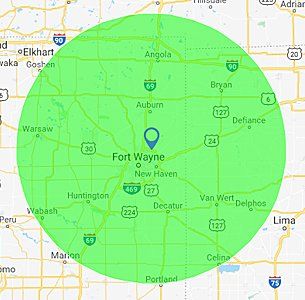Water Well Drilling FAQs
Problems With Your Well? | Have a Question? | Kaufman Well Drilling
Value Statement OneValue Statement TwoValue Statement Three
Kaufman Well Drilling Answers Commonly Asked Questions
- Do Water Well's go Dry?
Normally, no. If your well is not producing water it is typically a pump issue, a screen issue or some other issue. NE Indiana and NW Ohio are blessed with an abundance of water. Read the following for more infromationon water well running dry
- Is the Water Quality Better the Deeper the Well?
The depth of the well typically does have an effect on the quality of water. The deeper the well, the further away from potential ground contaminants and pollutants.
- How do you know where to drill?
Since we are blessed with an abundance of water in this area, where the well is drilled usually depends on where the customer wants it located , and if we can fit our equipment into that area.
- At what Point do you Drill on a new home construction?
Normally, like to have the house framed up before we drill as to not be in anyone elses way. We have drilled before construction startsand we have drilled when it is about complete, it all depends on customer and contractor wishes.
- How long does it take to drill a new well?
Normally, a well can be drilled in 3-4 hours, with a few additional hours to complete the hookup process.
- How much Does it cost for a new well?
Cost is dependant on several factors: The depth of the drill, the size of the water pump and tank , or whether its a constant pressure or conventional system.
- Should I Chlorinate my well and how often?
Yes, your well should be chlorinated, however the Department of health recommends not to do it yourself but to have a professional chorinate it for you. You should have your well tested for contaminants and bacteria every few years and if it shows signs of either you should contact a professional to have it tested.
- How often should i get a bacteria test on my water?
You should have your well tested for bacteria and contaminants every few years. We offer water testing and treatment.
- What is the average life span of a water well pump?
The average life span of a water pump is 15-18 years, but can be affected by several factors. A water pump’s duty cycle plays a large role in how long it will last. A duty cycle is how often the pump runs throughout the day. Motor quality and size of the pump, water sediment, quality of installation and type of pump are also a determining factors.
- Wate is the Life span of a water well pressure tank?
About the same as a water well pump, but can lst up to 20 years depending on certain factors.
- What is included with a new wel? Pump, tank, etc
When we drill a new well for a house, we include everything to get water into the house and ready to hook to the house. If it is a replacement well, again we provide everything needed, and hook it back up to the house.
- Do you have guarantees?
We offer and honor all manufacturers warranties, which can last from 3-5 years.
- How far away from my septic system should my water well be?
Per conty and Indiana state law, the well and septic must be seperated by at least 50 ft.
- What would cause low pressure or no pressure water flow?
No pressure or low pressure can be caused by several things. Pump issue, tank issue, softener issue, plugged filter in the line, too small of plumbing,or a faucet issue. Many things can cause low or now pressure.
- How deep does my well have to be?
Drilling a Water Well for household use will usually range from about 100 feet to 500 feet deep, but... When drilling a new well for your home or business, the depth of the well depends on the geology and underground water levels of the area. The averagewell depth in NE Indiana is 100 feet.
- Does the depth of a well make a difference?
Yes, the depth of the well can make a difference. The further the drilling , the further the water source is away from ground contaminants and pollution.
260-837-7191
Our Service Area

